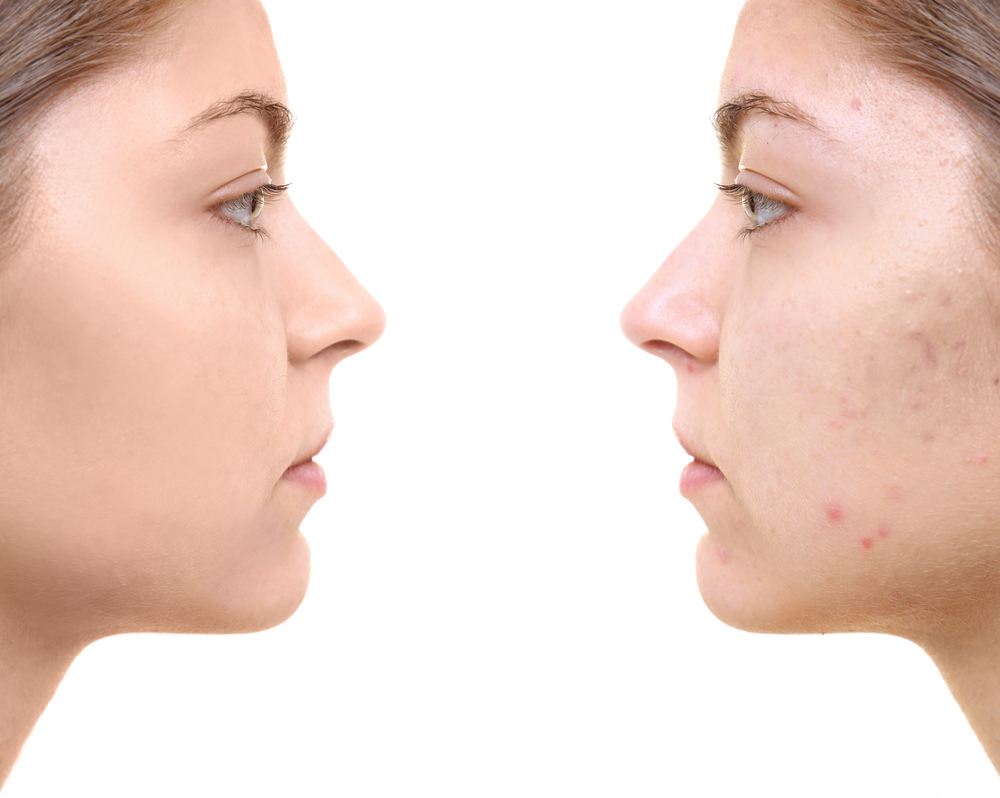Acne is the most common skin condition in the United States. It causes blemishes to appear on the skin, with pimples and blackheads appearing most frequently on the face, neck, chest, back, and shoulders. Most people experience acne problems during their adolescent years but grow out of it by adulthood. However, acne can continue throughout adulthood as well. Dr. Michael Krathen is a board-certified dermatologist who offers many effective acne treatments at Essential Dermatology in Natick, MA, for patients from Weston, Wayland, Framingham, Wellesley, and surrounding communities.
What Causes Acne?
Acne is caused by pores that are clogged with debris and oil. Bacteria start to grow in these areas and cause acne. There are many factors that can contribute to flare-ups. Hormones, sleep, exercise, diet, and genetics all contribute to acne. Some people can see a reduction in acne by making lifestyle changes, while others deal with chronic acne that never goes away.
Acne Symptoms
- Red, inflamed skin
- Blackheads
- Whiteheads
- Pimples
- Cysts
- Papules
- Nodules
- Dark spots on the skin
Treatments for Acne
Dr. Krathen can recommend treatments depending on the type of acne, its causes, and your skin type. Mild acne can usually be improved by using products containing benzoyl peroxide or salicylic acid. If acne is more severe, professional treatment may be needed. Treatments offered at Essential Dermatology include:
- Antibiotics
- Topical treatments
- Laser therapy
- IPL photofacials
In addition to these treatments, it is important to incorporate a solid skincare regimen as part of your daily routine to help prevent and manage acne. Cleansing is essential for removing dirt, oil, and makeup from the skin, which can clog pores and contribute to acne. To remove impurities and help prevent breakouts, wash your face with a gentle, non-comedogenic cleanser twice a day—once in the morning and once at night. Some people might also consider regular facials or other aesthetician treatments to deeply cleanse and hydrate their skin.
Along with following a good skincare routine, it is important to avoid certain habits that may contribute to acne, such as touching your face or picking at your acne. Your hands can transfer bacteria and oil to your face, potentially leading to clogged pores and breakouts.
While it may take time to see results, sticking to a consistent skincare routine may prevent flare-ups and improve your skin’s overall health and appearance. Dr. Krathen will go over recommended at-home treatments with you.
Acne Scarring
Severe acne can result in scarring, which is often a frustrating and long-lasting reminder of the acne you once had.
Acne scars occur when the skin is damaged by the body’s inflammatory response to acne. The body tries to repair the damaged skin by producing collagen, but sometimes the repair process is incomplete, leading to the formation of scars.
Acne Scar Treatment Options
Fortunately, several treatment options are available for acne scarring. Chemical peels, lasers, and microneedling are effective treatments for improving the appearance of acne scars.
Chemical Peels
Chemical peels use a solution to remove the outer layer of the skin, promoting the growth of new, healthy skin cells. This can improve the appearance of mild to moderate acne scars.
Laser Therapy
Laser therapy uses focused light energy to target the skin’s underlying layers, stimulating collagen production and promoting the growth of new skin cells.
Microneedling
Microneedling makes tiny punctures in the skin to stimulate the body’s natural healing response. This leads to increased collagen production and the formation of new skin cells.
While these treatments can be effective in improving the appearance of acne scars, they may not completely eliminate them. It’s important to talk to a dermatologist about which treatment options are best for your specific type of acne scars.
Acne FAQ
Q: How common is it for adults to struggle with acne?
Acne is often thought of as a teenage problem, but it’s actually quite common for adults to have acne as well. In fact, studies have shown that up to 50% of adult women and 25% of adult men experience acne at some point in their lives. Adult acne can be caused by a variety of factors, including hormonal changes, stress, and certain medications.
Q: What’s the best treatment for acne scars?
The best treatment for acne scars depends on the type and severity of the scars. Some of the most effective treatments for acne scars include chemical peels, lasers, and microneedling. These treatments stimulate collagen production and promote the growth of healthy, new skin cells, which can improve the appearance of acne scars.
Q: Will acne come back after treatment?
It’s possible for acne to return after treatment, especially if the underlying causes of the acne are not addressed. However, with the right treatment plan and a good skincare regimen, it is possible to manage acne and prevent it from coming back. It’s important to work with your dermatologist to develop a personalized treatment plan that considers your skin type and the underlying causes of your acne.
Q: Is it ever safe to pop a pimple myself?
It is generally not recommended to pop a pimple yourself because this can lead to further inflammation, infection, and scarring. Popping a pimple can also push bacteria and oil deeper into the skin, making the acne worse. If you have a pimple that is particularly painful or bothersome, it’s best to see your dermatologist, who can safely extract the pimple and help prevent scarring.
Q: Are there any skincare products I should avoid to prevent breakouts?
Skincare products that are heavy or greasy, such as certain moisturizers or sunscreens, can clog pores and contribute to breakouts. Even if a product is labeled non-comedogenic, it’s important to check the ingredients of your skincare products carefully for pore-clogging substances. Many online tools are available to help you with this step. Additionally, skip the harsh scrubs or exfoliants because they can irritate the skin and worsen acne.
Schedule a Consultation
At Essential Dermatology, Dr. Krathen helps patients address skin conditions like acne. He will recommend treatments for you that help to relieve your acne symptoms but also helps your skin to remain healthy. To get started, call our office at (508) 827-2615 or request a consultation by filling out our online form. To book an appointment, schedule your visit as a new patient using our online scheduler or as an existing patient using our the Mass General Brigham Patient Gateway.
Meet Dr. Michael Krathen
Dr. Michael Krathen is a board-certified dermatologist with more than a decade of medical training and experience. A specialist in both medical and cosmetic dermatology, he uses expertise, collaboration, and compassion to help people of all ages discover their healthiest and most radiant skin.
Credentials You Can Trust









